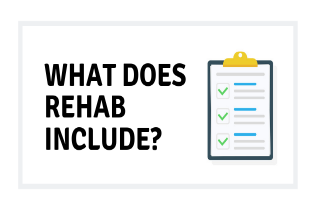Are you in need of addressing a drinking problem, but you don’t have enough time to devote to rehab? Outpatient rehabilitation may be just the right choice for you, especially if you require both the proper treatment AND flexibility.
In this article, we provide general information about outpatient rehab treatments, stages, and operating principles. Finally, we devote the last two (2) paragraphs to the financial aspect of this type of treatment with a section for your questions at the end.
Basic info on outpatient rehabs
There are two (2) main types of outpatient alcohol rehabilitation treatments, namely: Intensive and Non-Intensive.
- Non-Intensive outpatient alcohol rehabilitation treatment entitles patients to recovery and aftercare treatments with or without medication and various other services, but does not include residing in or at the facility.
- Intensive outpatient alcohol rehabilitation treatment requires a couple of hours a day (usually 3-5 hours) several days a week (3 or more) for recovery/aftercare treatments or additional services.
The length of the treatment for both these types of rehabs is determined on individual basis and can be anything from a couple of months to a year’s time.
Outpatient alcohol rehabilitation stages
Successful rehabilitation and recovery from drinking problems includes three (3) very important steps, from getting involved to aftercare. Here are the basic stages of alcohol rehabilitation
1. Getting involved
First and foremost, the most important step in treatment is to come to terms with a drinking problem and decide to seek help. It is already a big success if you are willingly getting involved, but if you are in denial….you can sabotage yourself from the beginning. Once you are willing to change, it means that you are already taking a step forward.
2. Reaching and maintaining sobriety
The second step may seem pretty daunting, especially if you cannot imagine living without your daily dose of alcohol, but it is doable. At first, withdrawal symptoms can make you vulnerable to relapse. Then, your thoughts or cravings can trigger a return to drinking.
Just keep in mind the purpose of sobriety: living a better life. Attending daily therapy or seeking psychological help can take hours, but is time well invested. Learning coping tools to live without drinking can lead you to long term-sobriety. Most importantly, make sure you stay away from alcohol and people who consume it, and surround yourself with people who will understand your struggle and support your recovery.
3. Aftercare
After you’ve achieved and maintained your sobriety for some time, you will be considered in early recovery from alcoholism. However, the risk of relapse is never really gone and is likely to occur even after years of sobriety. Keeping therapy, treatment, and support group attendance as a habit can help you in the weeks and months after outpatient care ends.
Outpatient alcohol rehabilitation protocol
The Center for Substance Abuse Treatment (CSAT) has come up with The Treatment Improvement Protocols (TIPs) for treating substance use disorders. These are consider the guiding principles of most rehabilitation centers. Some of the key principles include:
1. Anyone in need of help should be immediately assisted when they request treatment.
2. Detoxification is just the first step towards successful rehabilitation
3. Treatment should take into consideration other needs of the patient, in addition to alcohol addiction.
4. The treatment must be assessed and modified if no progress is achieved.
5. Each patient is prone to relapse.
6. Recovery from alcohol addiction is a long-term process and oftentimes it takes multiple episodes of treatment.
7. After care is a must for many addicts in rehabilitation.
Outpatient alcohol rehabilitation costs
The cost of an outpatient alcohol rehab will vary among facilities and will largely depend on the length of time and the services included. However, outpatient treatments are usually always less pricey than inpatient rehab. And they average about $150 per day of treatment or around $3,000 per treatment episode. What’s more, heath insurance can cover a significant part of your treatment so make sure you find one that you can afford.
Low cost outpatient alcohol rehabilitation
Fortunately, lacking financial means is no longer an excuse not to go to rehab since there are plenty of opportunities to receive low cost or free of charge rehab treatment. Check the database of the Substance Abuse and Mental Health Services (SAMHSA) website and find one that can take you in.
Outpatient rehabilitation questions
Still have a burning question about alcohol rehab in an outpatient setting? Please send us your questions in the comments section below. We’ll do our best to respond to you personally and promptly.









Related Posts